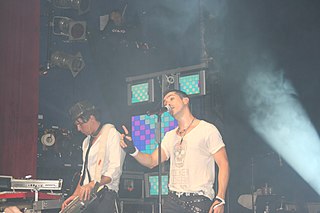
Mœnia is a Mexican electronic/synthpop/ambient group. Popular within the Latin club scene while simultaneously pioneering a darker, more experimental, more poetic side of Spanish-language electronica, Mœnia has had three top-20 hits. Mœnia is often considered one of the first successful experimental Mexican music composers and performers, finding commercial viability in a market normally dominated by Latin ballad crooners, teenage vocal groups and musical styles with more mass appeal like cumbia, reggaeton and ranchera. Mœnia is also popular in other parts of Latin America, including the Argentinian and Chilean music markets, where they have also charted. Some of their most recognized singles include "Estabas Ahí", "No Dices Más" and "Manto Estelar".
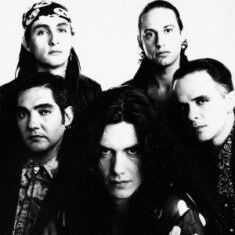
Caifanes are a rock band from Mexico City. Formed in 1987, the group achieved international fame during the late 1980s and early 1990s. The original line-up consisted of Saúl Hernández, Sabo Romo, Alfonso André (drums) and Diego Herrera. Alejandro Marcovich later joined as lead guitar player. Caifanes' style can be described as a hybrid of British new wave, progressive rock and Latin percussion underscored by deep, somber and Latin American-Mexican Spanish-influenced lyrics and the vocal style of Saúl Hernández. Members of Caifanes have cited The Cure, The Beatles and King Crimson as major influences. Adrian Belew produced their third studio album, El Silencio, and made a guest appearance on the track Piedra.

Fobia is a Mexican rock en español band from Mexico City.
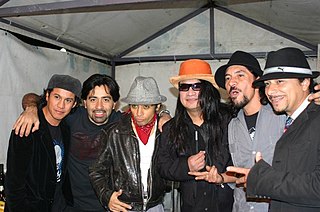
La Maldita Vecindad y los Hijos del Quinto Patio is a band formed in Mexico City in 1985. They are pioneers of rock en español and one of the most influential rock bands in Mexico.
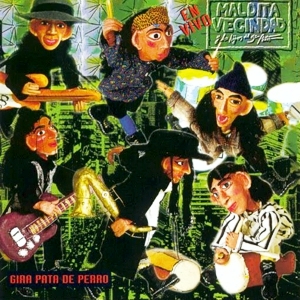
En Vivo: Gira Pata de Perro is a live album released by Mexican rock band Maldita Vecindad y los Hijos del Quinto Patio. Their third album was released on February 1, 1993 under the BMG label.
The Premios MTV Latinoamérica were the Latin American version of the Video Music Awards. They were established in 2002 to celebrate the top music videos of the year in Latin America and the world. They are presented annually and broadcast live on MTV Networks Latin America. Until 2004, all the VMALAs were held in Miami. The 2005 edition was the first one planned to be held outside the United States, but the show was cancelled. The 2006 VMALAs were held in Mexico City, and therefore were the first ones to actually be celebrated in Latin America. In 2010 the awards were permanently cancelled.

Rock en español is a term used to refer to any kind of rock music featuring Spanish vocals. Compared to English-speaking bands, very few acts reached worldwide success or between Spanish-speaking countries due to a lack of promotion. Despite rock en español's origins in the late 1950s, many rock acts achieved at best nationwide fame until the Internet consolidated the listeners. However, some rock en español artists did become internationally popular with the help of a promotional campaign from the mid-1980s to the mid-1990s called "Rock en tu idioma". Some specific rock-based styles influenced by folkloric rhythms have also developed in these regions. Some of the more prominent styles are Latin rock ; Latin alternative, an alternative rock scene that blended a Latin sound with other genres like Caribbean ska, reggae, and soca; or Andalusian rock, a flamenco-influenced style that emerged in Spain.
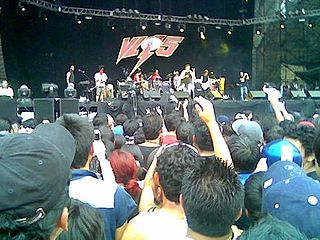
Vive Latino - Festival Iberoamericano de Cultura Musical is an annual music festival held in Mexico City. It is one of the most important music festivals in Mexico, featuring a great variety of groups of many genres.
Miguel Ángel Mateos Sorrentino is an Argentine rock singer-songwriter from Villa Pueyrredón, Argentina. Outside Argentina he is considered one of the most important exponents of Rock en Español, specially in the 1980s when he along with Charly Garcia, Soda Stereo, Enanitos Verdes, Virus, Sumo, Fabulosos Cadillacs, Rata Blanca, and many more bands became international stars in the so-called "Argentinian Invasion" of rock music that swept Latin America and parts of North America and Europe. It helped popularize Spanish-language rock outside Argentina, and make the genre a commercially successful industry.

Caifanes: La Historia is a compilation album by Mexican Rock band Caifanes released almost two years after their sudden breakup. Singles from 1987 to 1994, including two previously unedited live recordings are included in this 24-track album. Disc 1 contains singles from 1987 to 1990; disc 2 contains singles from 1992 to 1994.
Latin alternative, or "alterlatino", is a brand of Latin rock music produced by combining genres like alternative rock, lofi, chillout, metal, electronica, hip hop, new wave, pop rock, punk rock, reggae, and ska with traditional Ibero-American sounds, in Latin Europeans and Latin Americans countries.

Fernando Arau is a Mexican comedian, actor, producer and director. He is best known for his TV roles, as Chicho in Televisa's hugely successful comedy "Cachun Cachun Ra Ra" (1981–1987) and Univision's daily morning show "Despierta America" (1997–2009).
Avanzada Regia was a musical movement in the mid-1990s from Monterrey in Mexico.

Siempre en Domingo was a Mexican variety show created and hosted by Raúl Velasco. The show aired on Televisa from December 14, 1969, until April 19, 1998, when Velasco retired.

Rostros Ocultos is a Mexican rock-pop band founded in 1985, who were moderately well known in the 80s. It was part of the post-movement started by Caifanes, and it was one of the bands that followed its principles, along with Santa Sabina, Neón, Fobia, El Tri, Kerigma and Maná, among others.
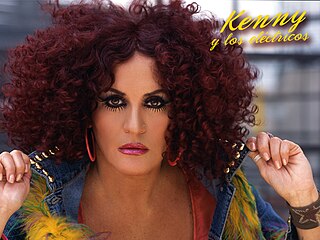
Kenny y los Eléctricos is a rock band founded in 1980 by the singer and band leader Kenny Aviles, who has been called "the mother of Mexican rock". The band started in Los Angeles, where they made their first public appearances under the name Kenny and The Electrics, playing in venues like Whisky a Go Go. They moved back to Mexico in 1980 and went on to be considered an internationally important Mexican rock band, emblematic of Mexican rock in the 1980s.

José Luis Paredes Pacho is a Mexican musician, researcher, writer and cultural advocate. He is the founder of the new cycle of Poesía en voz alta Mexican poetry festival, Radical Mestizo's Festival de Mexico music program and founder member of Maldita Vecindad y los Hijos del Quinto Patio where he was drummer during 18 years. He is one of the researchers about Rock music in Mexico and counterculture movements in the country.
This article includes an overview of the major events and trends in Latin music in the 1980s, namely in Ibero-America. This includes recordings, festivals, award ceremonies, births and deaths of Latin music artists, and the advancement and adjournment of the genre from 1980 to 1989.

Los Amantes de Lola are a Mexican rock band, formed in 1987 in Mexico City. The group is known for their energetic live performances and contributions to the Rock en Español and alternative rock scenes. With a career spanning over three decades, Los Amantes de Lola have influenced generations of rock musicians in Mexico and Latin America.













